The Siberian husky is an elegant dog with an amazing black and white coat of fur. They originated in Northeast Asia where they were bred to be companion dogs and sled pullers. A Russian fur trader by the name of William Goosek brought them over to Alaska during the Nome Gold Rush. After that, they became popular to own and now we see them all over the place including the hotter climates of Spain and California.
The Siberian husky may look majestic and regal, but it also has its downsides as a house pet. There are all-too-common health problems that can’t be missed. If you are thinking of adopting a Siberian husky or already have one and want to make sure you take care of your precious doggo the right way, look no further than this article. We will go over 12 of the most common health problems Siberian huskies have.
#1 Cataracts
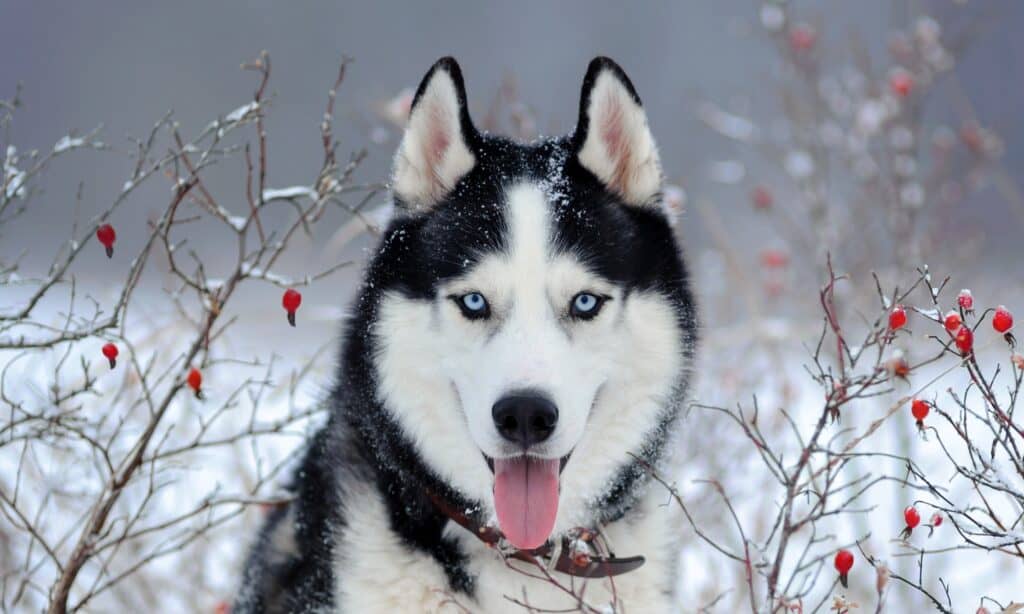
Siberian huskies have striking blue eyes that are prone to having problems at a very young age.
©iStock.com/format35
The Australian Veterinary Journal has stated that eye problems are very common in Siberian huskies. The most common eye problem these furry dogs can get is cataracts. It’s thought that cataracts are hereditary and about 10% of Siberian huskies start developing cataracts at around six to 18 months. Luckily for you and your precious pup, cataract surgery is available to treat them. Make sure you watch out for cloudiness forming on the eye and go to your vet on a regular basis to assure he is checked out for all eye problems your dog may have.
#2 Progressive Retinal Atrophy
As mentioned above, Siberian huskies have the unfortunate luck that they can develop a host of eye problems. One of them is progressive retinal atrophy. It affects the husky’s retinas and it is believed to be hereditary. More common in males, early detection is key to ensuring proper eye health. Unfortunately, no treatment is available, but there are steps to slow down this degenerative disease. Pay attention to your dog if he runs into things or can’t see properly at night. Your vet can also assist in creating a pathway to ensure proper care.
#3 Corneal Dystrophy
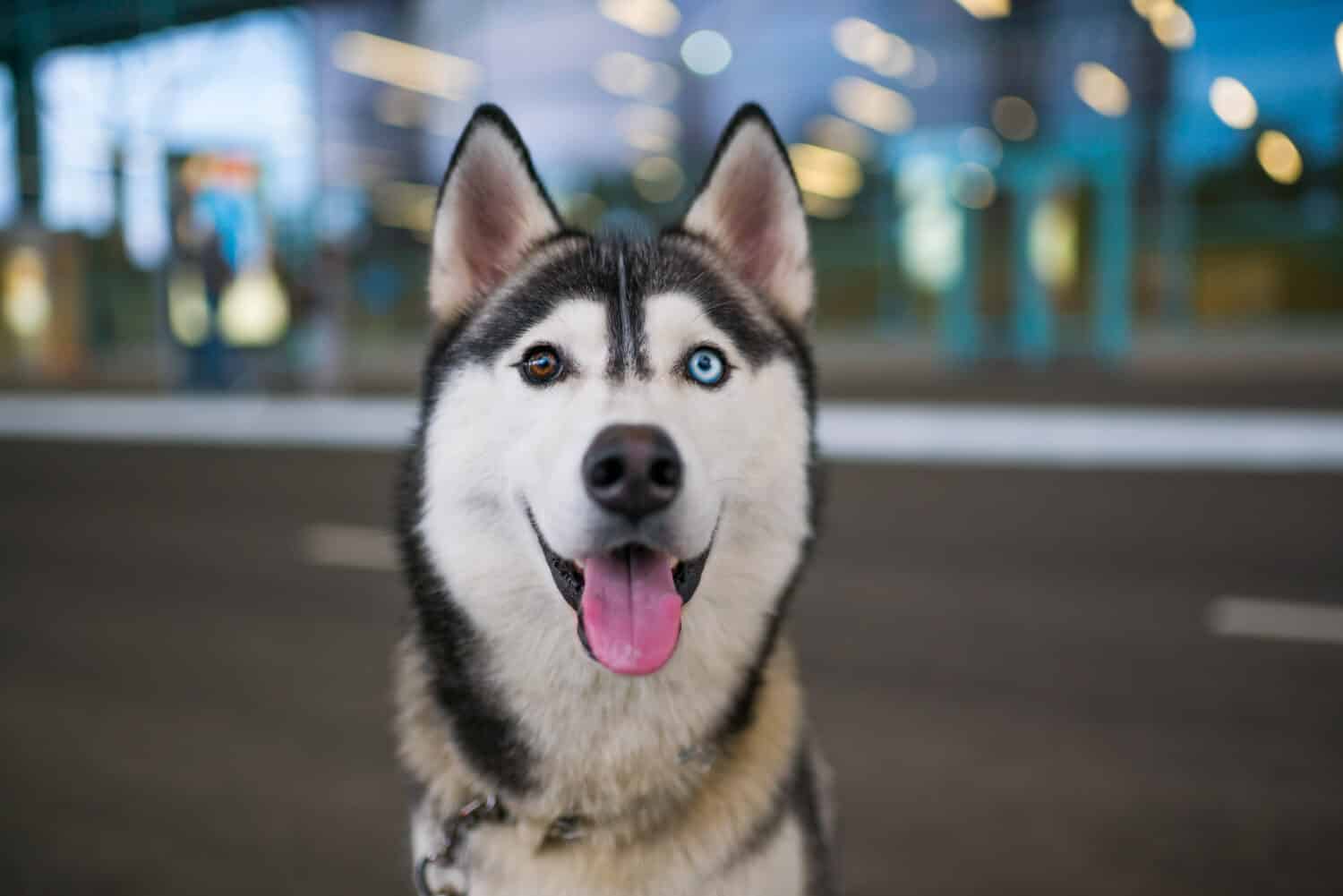
Siberian huskies can have blue eyes, but also heterochromia. These dogs are also prone to having many eye problems.
©u4f_tol/Shutterstock.com
Also inherited, corneal dystrophy affects the eye’s cornea. If you start noticing whiteness or white spots in the cornea, then it’s a sign that your husky has started to develop corneal dystrophy. The good thing about this is it doesn’t inflict pain on your lovable pup. Once it becomes advanced it can create an ulceration in the cornea. That’s when your husky will have blurry vision or blindness. Unfortunately, there is no cure or effective treatment for corneal dystrophy yet.
#4 Glaucoma
Like the previous three health problems, it seems that eye problems run the gamut in what affects a Siberian husky. Glaucoma is another eye problem. If you see that your playful husky has watery eyes, redness in the eyes, or blue corneas that are different than its eye color, it could be glaucoma. It can be painful for your husky, so the best thing to do is go to your vet to check out effective treatment.
#5 Pannus
This is yet another eye problem for Siberian huskies. With pannus, the cornea can become inflamed and can darken over time because of the sun or bright light exposure. This eye problem is quite painful and can lead to blindness. The best thing to do is go to your vet, who may prescribe medication to treat it.
#6 Hypothyroidism
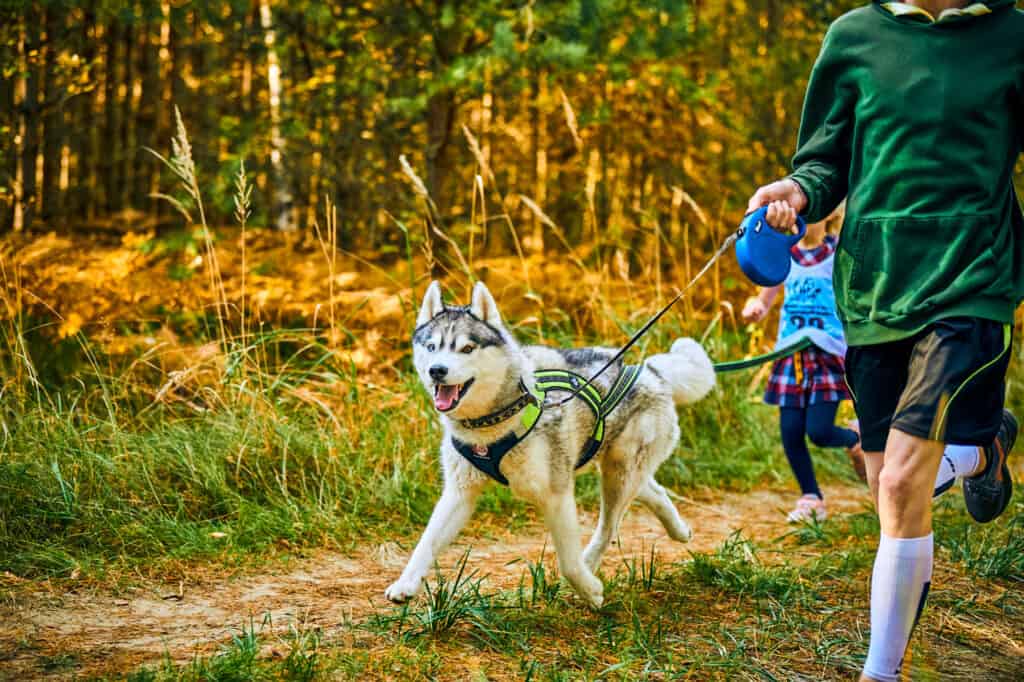
Siberian huskies are playful, energetic dogs that require a lot of exercise.
©iStock.com/TRAVELARIUM
Just like humans, hypothyroidism affects the thyroid glands, which can affect your husky’s metabolism. Tell-tale signs that your playful pup has developed hypothyroidism are weight gain, skin problems, or even hair loss. Unfortunately, there is no cure for hypothyroidism. Management of it is possible, though. As with all diseases and illnesses, consult your veterinarian on your options if you suspect your friend has this.
#7 Hip Dysplasia
Hip dysplasia is actually something that can happen to any dog. When the hips don’t develop correctly, you have loose joints, which can lead to arthritis. This is quite common in Siberian huskies. If you see your dog limping on one side, having difficulties standing or sitting, or even having trouble urinating or defecating, then those could be early symptoms of hip dysplasia. Go to your vet to ask for their recommendation. Luckily, there are options for treatment and management available, including surgeries.
#8 Zinc Deficiency
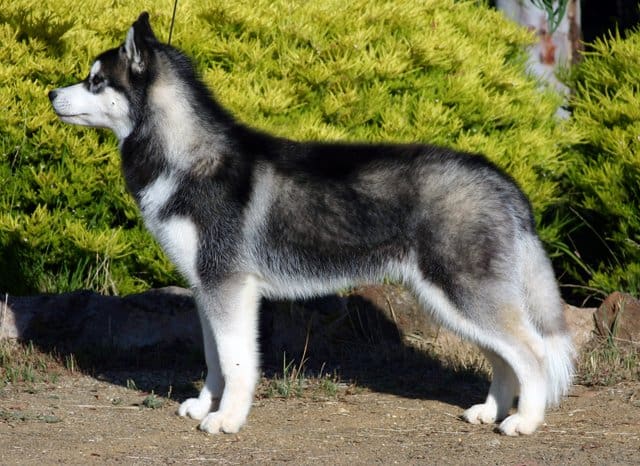
Siberian huskies have a shiny, thick coat of black and white.
©Utopialand / CC BY-SA 4.0 – License
According to the Journal of Small Animal Practice, veterinarians found that Siberian huskies are prone to having zinc deficiencies. More often than not, they were diagnosed with zinc-responsive dermatosis. What all of this means is that without the zinc that dogs, especially this breed, need, they start to experience skin problems. Red, flaky, bald, and oozy skin can form around key places like the mouth, feet, eyes, or ears. The best thing to do in this situation is to go to your vet and get zinc supplements.
#9 Uveodermatologic Syndrome
Like in some of the items above, this syndrome is an eye problem, but it can also affect the skin with pigmentation problems and the nervous system. In rare but severe cases, huskies can become blind from this syndrome. Unfortunately, there aren’t really tell-tale signs for this disease. The closest you can get to a symptom is if you notice consistent redness in your husky’s eyes. Fortunately, this condition is treatable with long-term medication to improve your dog’s immune system.
#10 Follicular Dysplasia
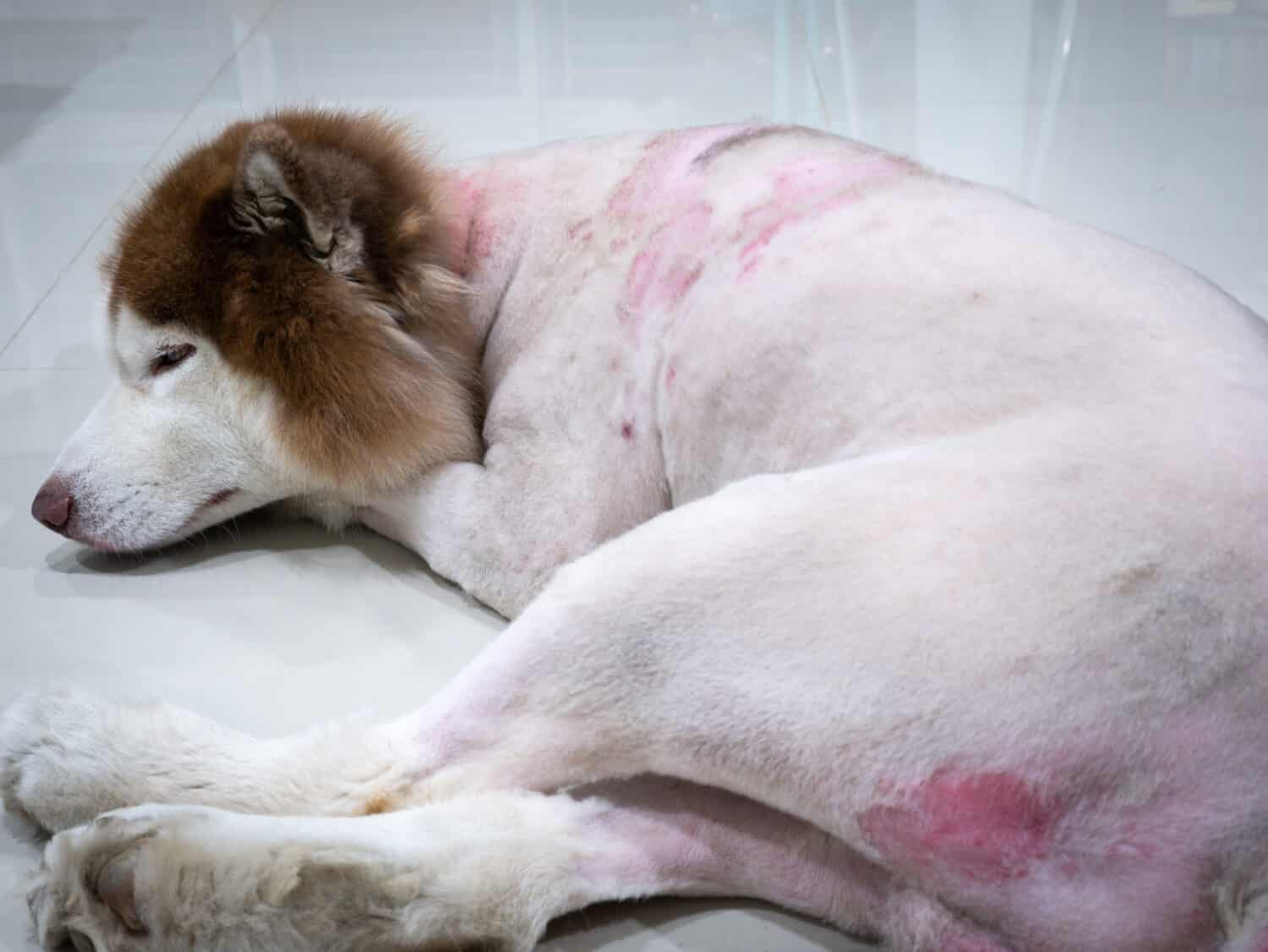
Siberian huskies are prone to having eye problems, as well as skin problems. It’s always smart to have regular check-ups with your vet.
©Wichatsurin/Shutterstock.com
In Veterinary Dermatology, veterinarians concluded that many dogs suffer from follicular dysplasia. For the Siberian husky, they may start developing some hair problems around the third or fourth month after they are born. This could include hair loss, abnormal hair growth, or even patchy skin. The bad luck is there is no cure for this disease. Go to your vet to find out the best way to treat follicular dysplasia. Most likely, they will recommend special shampoos or topical medications.
#11 Pemphigus Foliaceus
Pemphigus foliaceus is the quintessential name for a disease. It sounds ugly, horrible, and weird. This disease attacks the immune system, specifically targeting skin cells. Your dog can develop skin crusts and even hair loss. Moreover, these crusts can pave the way for bacteria to form. This can cause infections and pain. There are medications your vet can recommend to keep this disease at bay. Unfortunately, there is no cure, though.
#12 Hot Spots
All dogs lick their feet and toes; it’s just something that is common. The thing to watch out for if you have a Siberian husky is that if the licking goes overboard, a hot spot can appear. Hot spots are like skin lesions. This can attract bacteria into these hot spots and can even spread to other areas. The best thing to do in this situation is to call your vet so you can get medication.
Conclusion
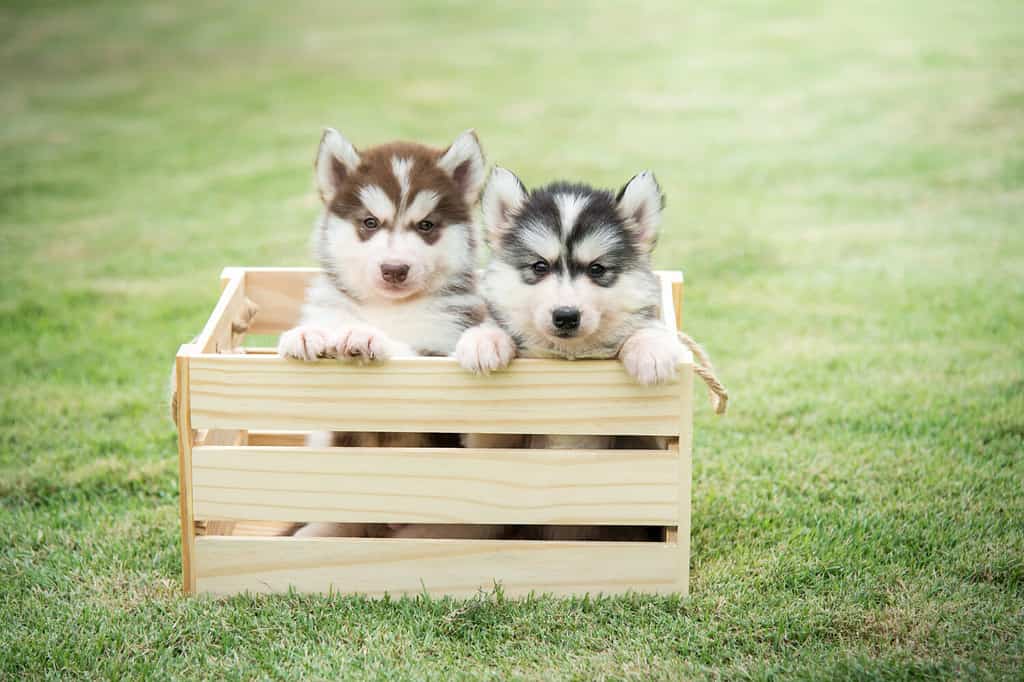
Siberian huskies are smart dogs and they’re also playful and joyful dogs to have around the house and yard.
©Sakura Image Inc/Shutterstock.com
Siberian huskies are a joy to have around the house. They are energetic, playful dogs that lift up your household when they are around. They are very friendly and there won’t be a problem if there are children around. These dogs are also naturally clean and don’t require excess bathing, either. Siberian huskies have a history of being companion dogs, and they will be your ultimate protector.
When thinking of getting a Siberian husky, it’s always smart to consult with your vet so you can properly take care of your doggo. You should also be cognizant of getting the best, nutritious food out there and ensure your husky gets a lot of exercise. Just watch out with your gates and fences, as these dogs are experts in escaping places. So, be on your toes!
Summary of Common Siberian Husky Health Problems
| Health Problems | |
|---|---|
| #1 | Cataracts |
| #2 | Progressive Retinal Atrophy |
| #3 | Corneal Dystrophy |
| #4 | Glaucoma |
| #5 | Pannus |
| #6 | Hypothyroidism |
| #7 | Hip Dysplasia |
| #8 | Zinc Deficiency |
| #9 | Uveodermatologic Syndrome |
| #10 | Follicular Dysplasia |
| #11 | Pemphigus Foliaceus |
| #12 | Hot Spots |
The photo featured at the top of this post is © iStock.com/Elayne Massaini
Ready to discover the top 10 cutest dog breeds in the entire world?
How about the fastest dogs, the largest dogs and those that are -- quite frankly -- just the kindest dogs on the planet? Each day, AZ Animals sends out lists just like this to our thousands of email subscribers. And the best part? It's FREE. Join today by entering your email below.
Thank you for reading! Have some feedback for us? Contact the AZ Animals editorial team.







